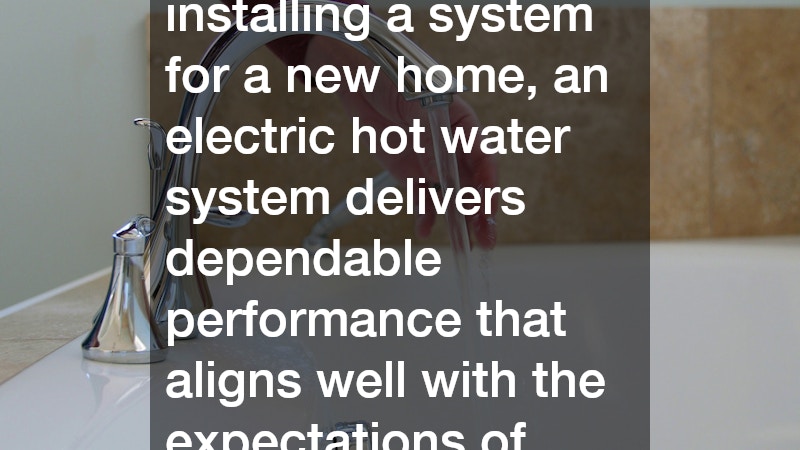In today’s energy-conscious world, homeowners are constantly seeking efficient, cost-effective and environmentally friendly solutions to meet their household needs. One area that continues to evolve with modern technology is home water heating. Among the various options available, electric hot water systems stand out as a reliable and practical choice for many Australian households. From reduced installation complexity to long-term energy savings, these systems offer numerous advantages that make them well worth considering.
This article explores five key benefits of choosing an electric hot water system for your home.
Convenient Installation & Maintenance
One of the standout advantages of electric hot water systems is their straightforward installation process. Unlike gas or solar systems, which may require access to gas lines or specific roof configurations, electric models can be installed in nearly any part of the home with access to electricity. This flexibility not only simplifies the process but can also reduce the initial installation costs.
In addition to easy installation, electric systems typically require less maintenance over time. There are fewer mechanical components involved and the absence of combustion elements eliminates the risk of gas leaks or pilot light malfunctions. For homeowners seeking a low-maintenance option, electric units are often the clear winner. Annual servicing remains important, of course, but the simplicity of these systems means fewer unexpected breakdowns and lower long-term repair costs.
Energy Efficiency for Everyday Use
Modern electric hot water systems are designed with energy efficiency in mind. Many newer models include smart features such as programmable timers, energy-saving modes and insulation improvements that reduce heat loss. These innovations ensure the system only heats water when it is needed, minimising electricity consumption and resulting in lower utility bills.
Another factor contributing to their energy efficiency is the ability to pair these systems with off-peak electricity tariffs. Many Australian energy providers offer reduced rates for electricity used during off-peak hours and electric hot water systems can be set to operate within these timeframes. This strategic use of electricity not only decreases household expenses but also alleviates pressure on the energy grid during peak times.
Reliable Performance in All Weather Conditions
Unlike solar hot water systems, which depend heavily on sunlight and may require a gas or electric booster during cloudy or rainy periods, electric systems provide consistent performance regardless of the weather. This reliability makes them particularly attractive for homes in regions with variable climates or limited sun exposure.
The assurance of always having access to hot water is a practical benefit that cannot be overstated. Whether it’s a chilly winter morning or a rainy summer evening, electric systems deliver dependable hot water at the flick of a switch. This consistent output is especially important for larger families or households with high daily water usage, where reliability is crucial.
Lower Upfront Investment
For homeowners working within a set budget, electric hot water systems typically represent a more affordable initial investment compared to their gas or solar counterparts. The units themselves are often less expensive and as mentioned earlier, the installation process is generally quicker and more straightforward. This combination of factors results in reduced upfront costs, allowing homeowners to upgrade or replace their existing system without excessive financial strain.
While operational costs will vary depending on electricity rates and usage habits, the affordability of purchase and installation makes electric systems an attractive option for those looking to balance performance with budget constraints. Over time, when paired with energy-efficient habits and off-peak electricity usage, the system’s operational costs can also remain quite competitive.
Environmentally Friendly Options
The environmental impact of home appliances is an increasing concern for many Australians. While electric systems have traditionally been considered less eco-friendly than solar alternatives, this perception is shifting as more households adopt renewable energy sources, such as solar panels, to power their homes. When used in conjunction with green electricity, electric hot water systems can become part of a sustainable household strategy.
In addition, newer models are continually improving in terms of energy consumption and overall environmental footprint. With careful model selection and efficient usage, homeowners can reduce greenhouse gas emissions and still enjoy all the benefits of modern hot water convenience. For those working towards a greener lifestyle, integrating an electric system with home-generated solar energy represents an effective and responsible path forward.
A Practical Choice for the Modern Home
Choosing the right hot water system is an important decision that impacts daily comfort, long-term costs and environmental outcomes. With their ease of installation, energy efficiency, weather reliability, affordability and evolving eco-friendly potential, electric hot water systems present a compelling case for modern households.
As with any major appliance purchase, it is important to assess your specific household needs, usage patterns and budget. Consulting a licensed plumber or hot water specialist can also help you select the ideal model and ensure a smooth, compliant installation process. Whether upgrading an outdated unit or installing a system for a new home, an electric hot water system delivers dependable performance that aligns well with the expectations of today’s homeowners.
.




